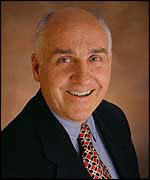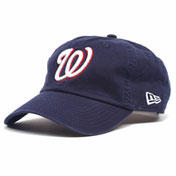

March Madness is totally cool. It's the last great truly populist national sporting event, in which we get to celebrate courageous underdog college basketball players from small towns and even smaller schools. Sure, the big schools usually end up in the Final Four, but March Madness is more about the journey than the destination, and it's a heckuva lot more fun to root for the Bucknells, the Vermonts and the UW-Milwaukees of the world than it is to stare in wonderment at the boring predictability of the strong finishes of Duke, Kentucky, UConn and all the rest of the perennial powers. Bracketology consumes us for a while, but only people using computer programs and an indefinite number of entries can actually produce winning predictions. After the bracket has been circular-filed, there are still the games, and that's what matters most.
Which is why it's such a drag to have to listen to Billy Packer do color commentary on CBS. Packer's been around forever. I grew up in University of Maryland country, and I have some reminiscence of him doing regional ACC coverage when I was young. But before we skewer him, here's the 411 on him:
Packer was born Billy Paczkowski. He grew up in Bethlehem, Pa. His father was men's basketball coach at Lehigh. Packer the younger was all-state in high school and an all-Atlantic Coast Conference guard at Wake Forest, where he graduated with a degree in economics. In 1965, he served as assistant coach at Wake Forest under Jack McCloskey. By the early 1970s, Packer was out of the game, had invested in a small radio station, and put himself on the air broadcasting high-school football. Later, a friend—there's always a friend, isn't there?—greased the wheels for Packer to get a shot as a fill-in college b-ball announcer. He then did his first ACC basketball game in 1972, and he continues to do just that on a regular basis. Packer broadcast his first NCAA tournament game in 1974. He even won an Emmy Award in 1993.
So Packer's an institution. He's also a consummate annoyance. He's often the absolute worst kind of color man. If a player drives the baseline, then pulls up and hits a short jumper, Packer will criticize the defending team and say, "You can't let him take that shot. Someone's got to come over and help." Of course, if someone DID come over and help, and the man with the ball dishes off to the other, now-undefended player, Packer will say, "There's a good lesson. You've got to stay on your man no matter what." One moment somebody will be dubbed "one of the finest three-point shooters in the game." Then, the moment he misses from outside, you can count on Packer to say, "He's got to show a lot more good sense when taking that shot. That was a bad shot." To Packer, a bad shot is one that doesn't go in the hole. A good shot is one that does. Fucking brilliant analysis.
Packer is one of those game analysts, not unlike football color guy Dan Dierdorf, who feels compelled to have a response to every little thing that happens on the court. To Packer, there's no effect that doesn't have an explainable cause; and no cause that doesn't have an apparent effect. If a team is playing absolutely kinetic defense and shutting down the opposition, then the moment the opposition gets a basket, there's a "breakdown." If a team reels off 12 consecutive points hitting three-pointers from long-distance, then the moment a guy goes inside for a layup and, say, is called for a charging foul, then the guy is not "sticking with what is working." In Packer's world, coaches have to be mind-readers and clairvoyants; all else is "bad coaching." If a player has a ball stolen from him, he's guilty of a "mental lapse." If a team is kicking ass, and Packer's praising every aspect of their game, but then loses at the end when somebody blows a free throw, Packer'll say, "See? You can't win these big games unless you can shoot free throws." If a team needs to put the other team on the foul line at the end of the game to get the ball back—but then the team hits those free throws— then Packer'll say, "You just can't foul this team. They're just too good at shooting free throws." On it goes.
Packer is just plain nonsensical. His mouth motors on, spewing crap and illogic that passes for "expert analysis." Yet he's been doing it for more than 30 years. And he won an Emmy. He's a walking example of that old saying, "If you can't dazzle 'em with brilliance, baffle 'em with bullshit." Way to go, Billy. Those words should be engraved on your Emmy.
Okay, now to the business at hand. The 2005 Final Four has been determined. After three out of the four Elite Eight games were decided in overtime, it''s down to Louisville playing Illinois, and North Carolina playing Michigan State. The much maligned Big Ten produces two Final Four teams, while the SEC and the Big 12 and the Pac-10 end up with nothing. Proving again how great this tournament is: It consistently defies the pundits and the people "in the know." I'd love to take a look at Billy Packer's bracket.
Louisville is an exciting team. But why did they have to go to overtime to beat West Virginia? The Illini also had to post a near-miraculous comeback to oust Arizona in overtime. This is a tough game to call, but I'm going with Illinois.
Michigan State was impressive in defeating Kentucky in overtime. They're a determined group, and they're well-coached by Tom Izzo. I guess they might have the heart to beat North Carolina, but I can't bet on that. Carolina looks like the closest thing to a juggernaut that we've got here. I say Carolina over Michigan State.
Then I see North Carolina over Illinois in the final game. After all this excitement, I guess it's kinda boring if the Tar Heels win it again. I can just hear Billy Packer: "North Carolina has one of the greatest basketball programs in the country. They proved it again here tonight."
Fucking brilliant, I tell ya. Give that man an Emmy.

